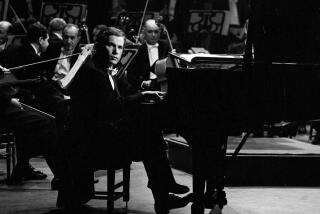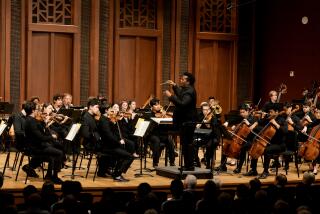Jazz Reviews : An Overindulgent Kenny G at Universal Amphitheatre
After the end of the encore of his two hour-plus show at the Universal Amphitheatre Saturday, saxophonist Kenny G continued to play alone for a few moments, as if he just couldn’t stop and had to be carried off stage by his band mates.
Yes, it was a joke, but it had a lot of truth to it too. The saxophonist, whose surname is Gorelick, obviously enjoyed performing, but his proclivity for overindulgence at times reduced his concert to a mere slew of notes that had more to do with show biz than making music.
Gorelick, a good musician with plenty of admirable qualities--his tone on tenor sax is particularly warm and appealing--played mostly instrumental pop pieces from his recent “Silhouette” and “Duotones” Arista LPs, tunes that were somewhat similar to each other and were outfitted with just a few chord changes.
Typical of these was “Silhouette.” The tune’s romantic melody was rendered with sweet, singing tones on soprano sax. Gorelick’s solo, which built in intensity, included blues licks, high, screaming wails and jagged Coltrane-ish acrobatics and culminated with a 1,000-note, non-stop barrage where he played so fast those notes became a blur. He suddenly dropped tempo and volume, played some soft tones and held one of them, through circular breathing, more than two minutes.
The capacity crowd loved this, as they did pop singer Smokey Robinson’s ace surprise appearance on “We’ve Saved the Best for Last” and Gorelick’s Pied-Piper-ish troupe through the audience on “All in One Night,” where he played a 15-minute solo, underpinned firmly by his tireless sextet. But, by cutting his solos down and offering more variety, Gorelick, who also played Sunday, might leave his listeners wanting more, rather than take the chance of burning them out by giving them too much.
Guitarist Stanley Jordan opened the evening with numbers taken from his new “Flying Home” EMI/Manhattan LP. Fronting a quartet instead of playing solo, Jordan established a pleasing jazz/fusion mood, employing his singular tapping technique and playing interesting, vigorous lines. His closing “Stairway to Heaven” was an abrupt switch, and its rock-ish posture got more crowd reaction than any of the inventive work that preceded it.
More to Read
The biggest entertainment stories
Get our big stories about Hollywood, film, television, music, arts, culture and more right in your inbox as soon as they publish.
You may occasionally receive promotional content from the Los Angeles Times.










